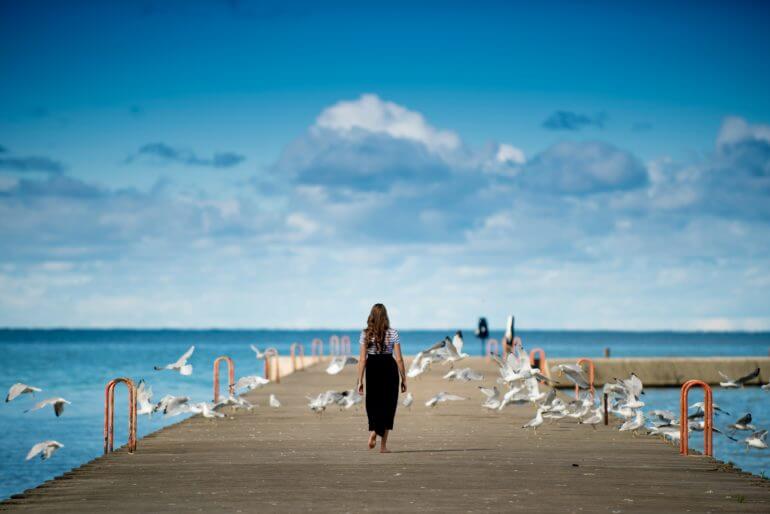
Stop Calling Orthodox Women “Oppressed”: Why I Dress Modestly At The Beach
A couple of weeks ago, The Washington Post featured a story about religious women at the beach in Herzliya, Israel. Three days a week, the beach is closed off to men, and women are able to enjoy a day at the sea solo. The story covered a photography series by Ofir Berman, who captured women in their element on those days.
The story in the Washington Post wasn’t blatantly negative, but the undertones are evident. It opens with a sullen, sad-looking woman in a swim dress and includes a quote from Berman that reads, “The series presents an inside view of a closed society maintaining its leisure culture in a public area and also reveals the transformation that the beach goes through during the year — from a mixed, open beach to a beach fenced off by rules. This contrast raises issues of cultural relativism and questions about the idea of freedom.”
Then, this week, The Daily Mail posted a story with the headline, “Orthodox Woman Reveals the Brutal Reality Adhering to the Strict Rules of Her Faith,” as she went shopping to find modest clothing in Target. The TikTok account, known as @SophiatheJew is actually an account where Sophia shares so much beauty in Orthodox dressing and other aspects of her Jewish life. She loves dressing modestly and the life she lives, and loves showing her followers how she does it. It’s a completely misleading article that makes it seem like Sophia is being forced to dress a certain way, instead of choosing to do so because of where her values align.
There’s an undertone that’s pervasive in so much of the media today — Orthodox women are oppressed and in one of these cases, need an entirely closed off beach in order to have a semblance of freedom or their own lives.
What’s highlighted in the Barbie movie — a world where women don’t care about men so much and just want to party by themselves — is looked down upon when it comes to religious Jews.
I don’t want to minimize the actual true stories, of people raised Orthodox, but not given a voice, not given agency. In families where these healthy values are not taught, an Orthodox life can feel treacherous. But in any home, where agency and self-worth aren’t taught, life will be more challenging and feel oppressive.
As an Orthodox Jewish woman myself, I don’t feel oppressed by having to wear what’s called a “modest” bathing suit — a long or three-quarter-sleeved swim top and skirt with leggings underneath. I feel empowered by it. (And to clarify – if a beach only has women on it, a regular bathing suit can be worn.)
It’s a bit ironic actually. Barbie just became the first movie to hit $1 billion that was directed by a female. It’s a movie all about female empowerment. Barbie isn’t an airhead in a bikini, chugging a beer and waiting for a guy to ask her out. She’s more than that. She’s the President, she’s on the Supreme Court, she’s a construction worker, she’s a police officer, the list goes on. The message I took was that while she happens to look good doing it, it’s not about the clothes, it’s about the woman inside of them.
That’s exactly what it feels like to wear a modest bathing suit at the beach. It’s not about my body anymore. I don’t have to worry about how my stomach looks, if my stretch marks are showing, or if someone is staring at my butt. I can actually enjoy my time by the water. Go figure, right? I’m not even going to go down the road of eating disorders and body image issues galore that we are still very much dealing with in society.
When did essentially wearing a bra and underwear become totally okay to do in public when it happens to be in nylon material? If a woman walked into a courtroom or a restaurant even like that, she would be totally balked at. Why don’t we flinch when there happens to be a body of water nearby?
I know the argument is that women can do anything, be anyone and the way she flaunts her body shouldn’t matter in the least. The problem is that it’s just not true. When you show off more body than not, people may start to look at you as that.
Just as important, is that some things are meant to be private. They’re meant to be sacred for people that deserve it. There is an extra level of beauty or sex appeal in what’s hidden. Giving those parts of you to the one person who actually respects them seems way more romantic to me than letting just anyone stare at my cleavage.
The women on the beach in these photos aren’t oppressed and they aren’t shamed into having to go to the beach without men. They actually can find the deepest level of freedom in expressing themselves without worrying about the unwanted male gaze.
Many of these women are professionals — hi-tech experts, maybe lawyers, doctors and yes, mothers too. They are so much more than just a body and don’t want to water down who they are to just that.
If you choose to wear a bikini at the beach, that is your choice, and one you should be able to make. However, if another woman who happens to be Jewish chooses to cover up a bit more, that should be normal too. That should be met without criticism, without saying that she’s oppressed because she chooses to cover up, because she’s not just a body. Maybe she’s covering up because she wants her soul to shine more, because her values promote it, because her body is just for her, maybe a spouse at times and not for anyone else.
A popular, secular influencer I follow often says, “My body is for living, not for looking,” and I think the Orthodox Jewish community expresses that well. Covering up, to let your body do the living without the looking should be appreciated in all spaces, Orthodox Jews included. We’re not restricted, we’re choosing to live this way. Every single day when we get dressed we make that choice. What’s more feminist than that?
If you found this content meaningful and want to help further our mission through our Keter, Makom, and Tikun branches, please consider becoming a Change Maker today.







